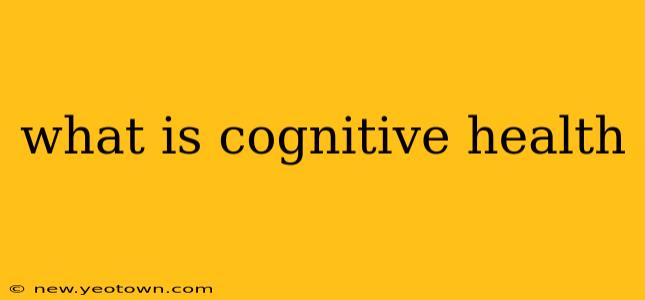What is Cognitive Health? A Journey into the Mind's Well-being
Imagine your brain as a finely tuned instrument, capable of composing symphonies of thought, painting vivid pictures of memory, and conducting complex calculations with ease. Cognitive health is the harmonious functioning of this incredible instrument—it's the overall well-being of your brain and its ability to perform its vital functions. It's not just about avoiding disease; it's about actively nurturing and enhancing your mental sharpness, memory, and thinking skills throughout your life. Think of it as a holistic approach to mental fitness, much like physical fitness focuses on the body.
This journey into understanding cognitive health begins with recognizing its multifaceted nature. It encompasses several key areas:
1. Memory: From remembering your childhood summers to recalling the grocery list, memory is a cornerstone of cognitive health. It allows us to learn, adapt, and navigate our world. A decline in memory can be a warning sign, but maintaining strong memory functions is crucial for daily life.
2. Attention and Focus: In our increasingly distracting world, the ability to focus and concentrate is paramount. Cognitive health helps us filter out irrelevant information and concentrate on the tasks at hand, improving productivity and reducing stress.
3. Processing Speed: How quickly your brain processes information influences your ability to respond, learn, and make decisions. A sharp processing speed makes everyday life more efficient and enjoyable.
4. Executive Functions: This critical area encompasses planning, organizing, problem-solving, and decision-making. These higher-level cognitive skills allow us to navigate complex situations and achieve our goals.
5. Language: The ability to communicate effectively, whether through speaking, writing, or reading, is intrinsically linked to cognitive health. Maintaining strong language skills enriches our interactions and contributes to overall well-being.
What Factors Affect Cognitive Health?
Numerous factors can influence your cognitive health, both positively and negatively. Let's explore some key areas:
H2: What are some lifestyle factors that affect cognitive health?
Lifestyle choices play a significant role in shaping cognitive health. A balanced diet rich in fruits, vegetables, and omega-3 fatty acids nourishes the brain. Regular physical exercise improves blood flow and oxygenation to the brain, enhancing cognitive function. Getting enough sleep allows the brain to consolidate memories and repair itself, while chronic sleep deprivation can have detrimental effects. Stress management techniques like meditation or yoga can mitigate the negative impact of stress on cognitive performance. Finally, engaging in mentally stimulating activities, such as reading, puzzles, and learning new skills, keeps the brain active and sharp.
H2: What are the signs of poor cognitive health?
Recognizing potential problems early is crucial. Signs of poor cognitive health can include noticeable memory lapses, difficulty concentrating, slowed processing speed, problems with language comprehension or expression, and impaired judgment or decision-making. These symptoms can be subtle at first, but their progression can significantly impact daily life. If you notice any concerning changes, consulting a healthcare professional is advisable.
H2: Can cognitive health be improved?
Absolutely! Cognitive health is not fixed; it's dynamic and malleable. By adopting a healthy lifestyle, engaging in brain-boosting activities, and addressing any underlying medical conditions, we can significantly enhance and maintain our cognitive abilities throughout life. Think of it as a lifelong journey of mental fitness, constantly nurtured and improved. This includes staying mentally active through puzzles, learning new skills, and socializing; maintaining a healthy diet, including brain-boosting foods; exercising regularly; and prioritizing sufficient sleep.
H2: How can I protect my cognitive health as I age?
Aging is a natural process, but it doesn't mean cognitive decline is inevitable. Proactive steps taken throughout life can significantly reduce the risk of age-related cognitive decline. This involves maintaining a healthy lifestyle, staying socially active, engaging in mentally stimulating activities, and managing any underlying health conditions effectively. Regular check-ups with healthcare professionals also allow for early detection and intervention if any cognitive issues arise. Maintaining a positive mental attitude and practicing stress reduction techniques can further enhance cognitive well-being throughout the aging process.
This journey into cognitive health highlights its importance in living a full and productive life. By understanding the factors that influence it and adopting healthy habits, we can all strive for optimal brain function and well-being throughout our lives.

